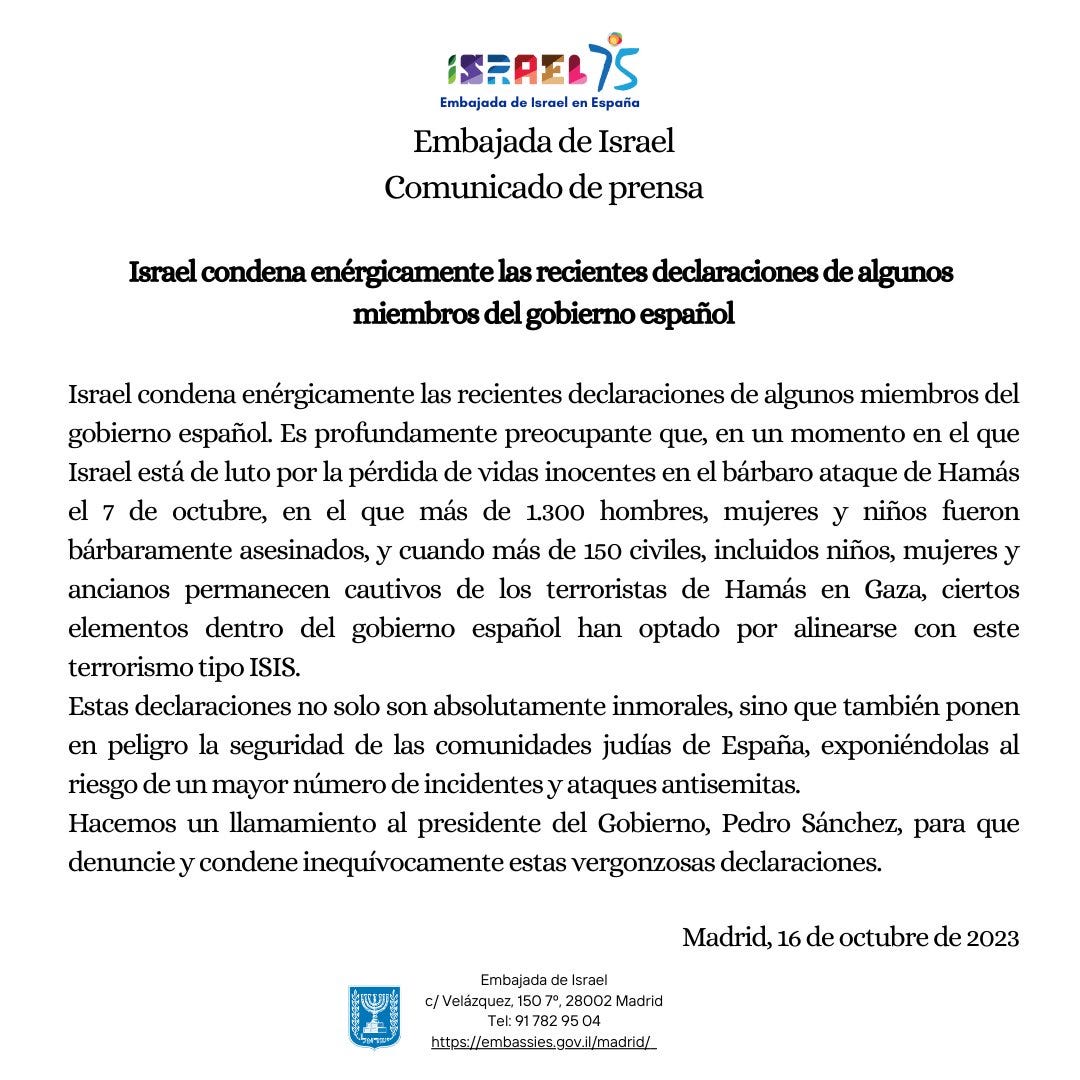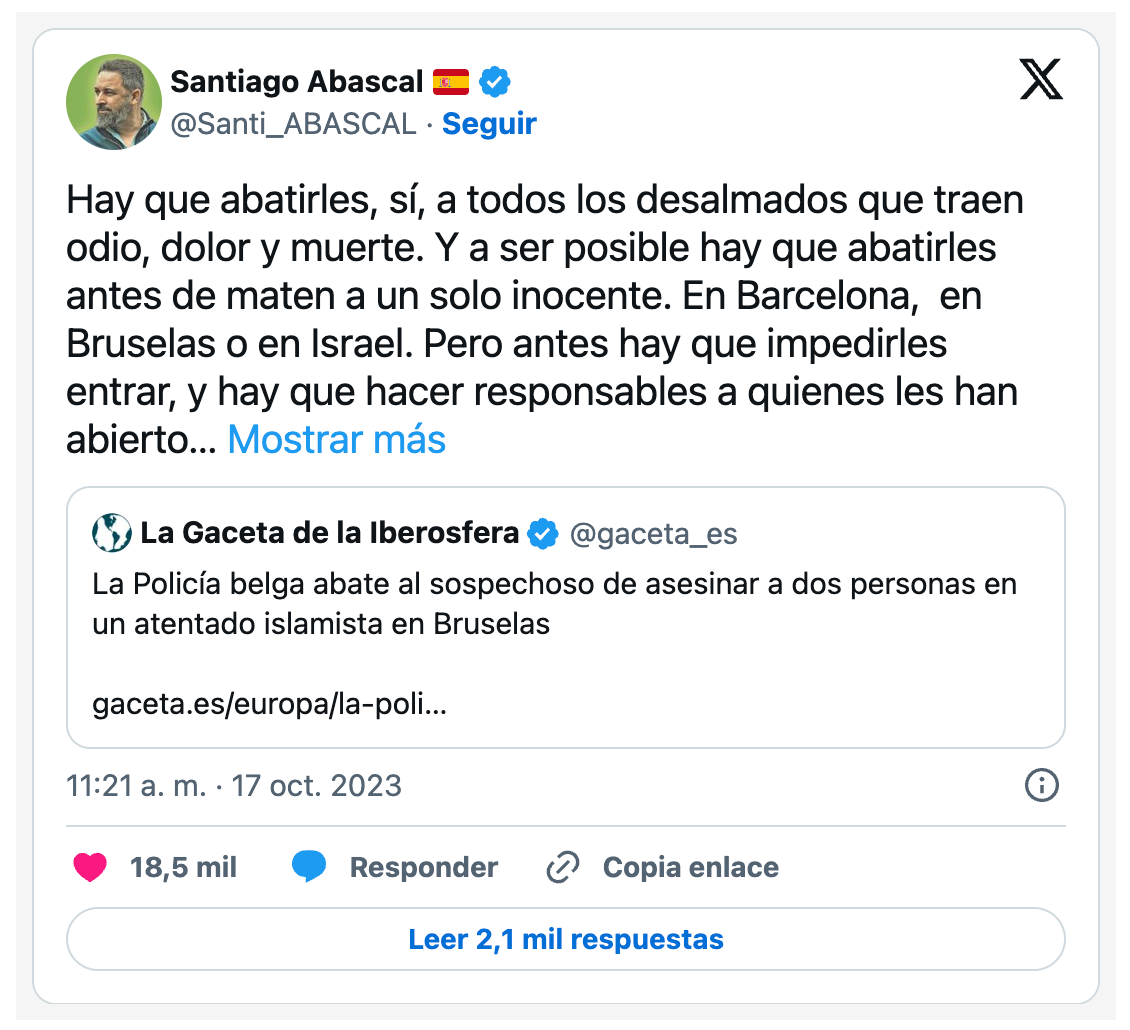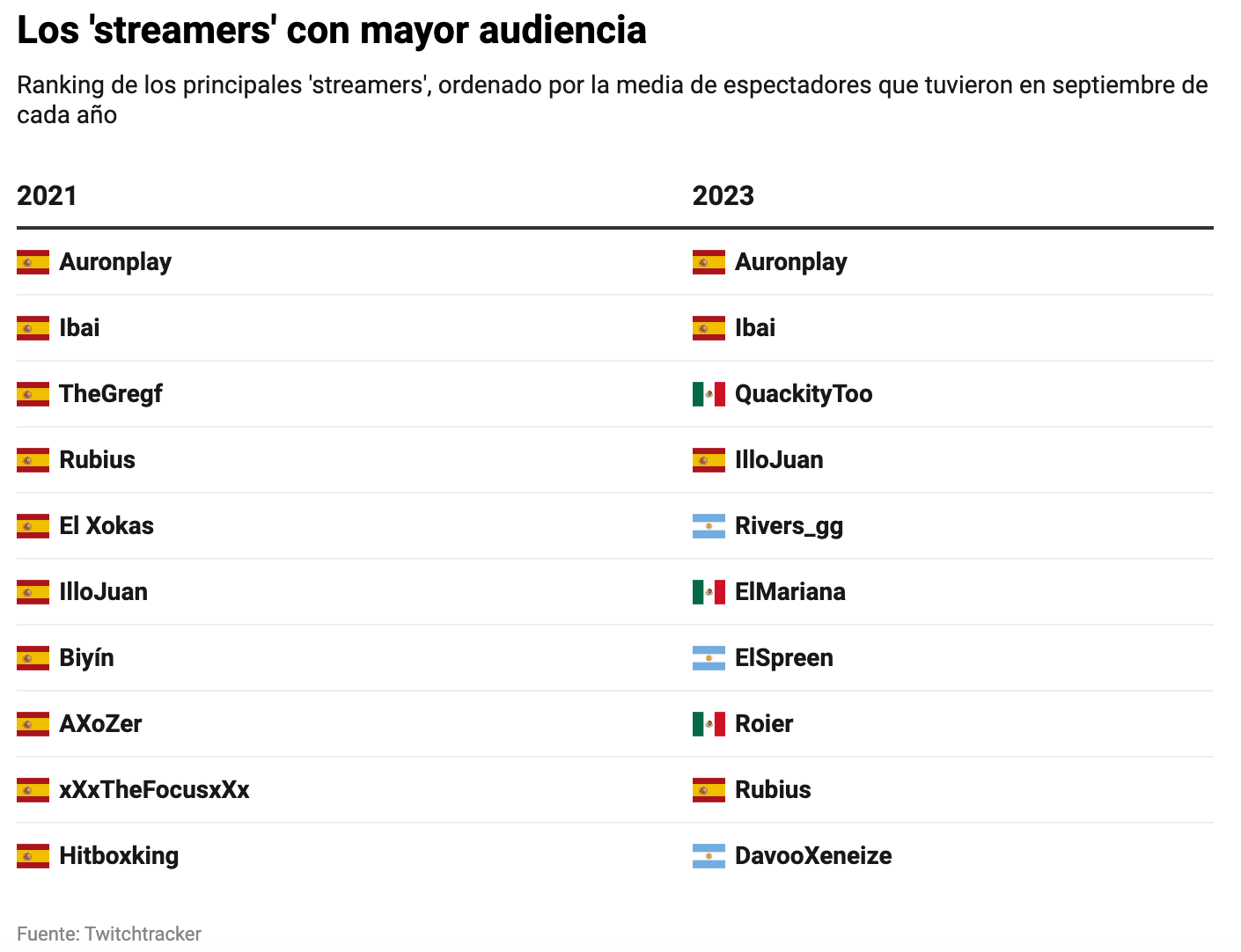🗯️ This Week in Spain: A Diplomatic Spat
Also Sevilla tragedy, olive oil shock, and more trouble for Barça.
By @IanMount and @AdrianBono | October 19, 2023 | Madrid | Issue #33
🎉 Welcome to The Tapa, an English-language, weekly newsletter about all things Spain!
🥜 This Week in a Nutshell: We somehow knew this was going to happen sooner or later. While the Spanish government has strongly condemned the brutal terrorist attack perpetrated by Hamas in Israel on October 7, the caretaker Minister of Social Rights from far-left Podemos decided to go rogue and accuse Israel of a “planned genocide”, creating a diplomatic crisis between both countries.
🙏 Remember that if this email gets truncated at the bottom because it’s too long, just click here to read the rest on Substack.
🙌 But wait, there’s more! The Tapa has its very own LinkedIn page to grow a new community. Please check it out and, if you’re so inclined, follow us here.
🕺If you haven’t subscribed yet, please do so by clicking on the button below.
🫶 And if you already have, please send this newsletter around to your friends and family and help us keep growing.
👍 And please give us a like! It takes less than three seconds to click on it and it fills our cynical hearts with joy.
Not on the same page
🇮🇱💔🇪🇸 Israel Is Not Happy With Spain
You just know that Spain’s PSOE socialist caretaker Prime Minister Pedro Sánchez has moments when he wishes he’d never formed a coalition government with the far-left Podemos. Like during the whole “Only yes means yes” law fiasco. And this week.
Specifically Monday. That’s when Israel’s embassy to Spain posted a contundente (that is, blunt) letter on X about its unhappiness with Sanchez’s caretaker government.
Did we mention it was blunt? It was. Let’s count the ways:
“Israel strongly condemns the recent statements by some members of the Spanish government,” began the letter from the embassy led by the veteran Romania-born diplomat Rodica Radian-Gordon.
“It is deeply worrying that...certain elements within the Spanish government have chosen to align themselves with this ISIS-type terrorism,” it went on as it condemned the “absolutely immoral” statements.
“We call on the President of the Government, Pedro Sánchez, to unequivocally denounce and condemn these shameful statements,” it finished.
Whoa! “…align themselves with this ISIS-type terrorism”? What happened? Let’s just say it’s a study of the pitfalls of a PSOE-Podemos coalition.
The center-left PSOE’s more hardline partners in Podemos have in recent days staked out a pretty typical far-left position on Israel and its reaction to Hamas’s massacre of some 1,400 Israelis (you know, the bombings, cutting off electricity and water in Gaza, etc.)—and it’s not exactly pro-Israel.
Podemos leaders in ministerial positions—Irene Montero (Equality) and Ione Belarra (Social Rights and 2030 Agenda), we’re talking about you—participated in a major solidarity-with-Palestine march Sunday in Madrid that attracted some 10,000 people.
More importantly, Belarra described Israel’s treatment of Gaza as “apartheid”, called its expected invasion a “planned genocide of the Palestine people” and called for Israeli PM Benjamin Netanyahu to be brought up on war crime charges.
Literally: “Today we want to raise our voice to denounce that the state of Israel is carrying out a planned genocide in the Gaza Strip, leaving hundreds of thousands of people without electricity, food and water, and carrying out bombings on the civilian population that are a collective punishment that seriously breach international law and may be considered war crimes,” Belarra said.
Now, you may agree with some of what Belarra said (and a lot of people have questioned the scale and intensity of Israel’s reaction), but the stream of unequivocally critical statements from a government minister (and their seemingly official nature) not long after the horrific Hamas attack seriously rubbed the Israeli ambassador the wrong way—and tore a rift in the relationship.
The letter put Sánchez’s government in a delicate position. It had to walk a fine line between pushing back on the Israeli ambassador’s comments and expressing its irritation with its Podemos partners.
The foreign ministry led by José Manuel Albares put out a statement saying that the government of Spain “categorically rejects the falsehoods expressed in the statement from the Israeli Embassy about some of its members and does not accept unfounded insinuations about them.”
The foreign ministry also said ministers have free speech and that it condemned the Hamas attacks and supported Israel’s right to defend itself within international law and by avoiding civilian casualties—and that a two-state solution was the only option.
Albares also said that he had spoken to Radian-Gordon to protest her “unfriendly” act and noted to Belarra (though not by name) that only he and Sánchez could speak for Spain’s foreign policy. As in, “Don’t think you make foreign policy, kids.”
And with that, Albares decided everything was all hunky-dory—so everyone could ignore him and go back to what they were doing.
Radian-Gordon for her part did not retract her embassy’s statement (and left it posted on X).
Nor did Belarra retract what she said, In fact, she doubled down on her statements in her own X post. She also said that yes indeed Podemos could speak in the name of the government because it was part of it. And Belarra then went on to demand that Spain break off diplomatic relations with Israel and reiterated that it should push to have Netanyahu and his whole government brought up on war crimes charges.
So we all agreed to disagree!
Side note: Spanish super-chef José Andrés pooped on Belarra’s statements, saying she didn’t deserve to be a minister and Sánchez should fire her.
Oh, final thing: The PSOE of Pedro Sánchez totally shot down Podemos replacement Sumar’s demand that the recognition of the state of Palestine be included in the coalition agreement they’re negotiating. Instead, the PSOE said it would do so alongside the EU when the time came.
🔔 A Message From Our Sponsor
This month, myGwork and It Gets Better are focusing on LGBTQ+ culture, aiming for inclusivity that mirrors society's diversity. Together they've launched a contest open to LGBTQ+ Employee Resource Groups, individuals collaborating with LGBTQ+ associations, and anyone supportive of LGBTQ+ diversity and inclusion.
The global contest in Spanish welcomes original short stories, short films from 2022-2023, and collaboration projects between companies and cultural initiatives. Prizes include the It Gets Better España Award (€500), a travel experience for the second prize, and honorable mentions for inclusive projects.
Content submission deadline is Oct. 20 (that’s today!), with winners announced on Oct. 31. Submissions should go to: comunicacion@mygwork.com
💬 Five things to discuss at dinner parties this week
1. The tragic Álvaro Prieto case
The tragic death of 18-year-old Alvaro Prieto in Sevilla this week has dominated the local news cycle for the last few days, not only because of the many questions in the case that remain unanswered but also because his body was found by complete coincidence on live television.
Prieto was an Engineering student from Córdoba who went missing in the early morning of Oct. 12 after spending the night with friends in a Sevilla nightclub. He was planning on catching an early train back home at the Santa Justa Train Station. However, he was late and missed it. He had no cash on him and his cell phone—where he not only had his e-ticket but also his credit cards—ran out of battery, so he was unable to buy a new ticket.
Renfe security staff said he then tried to board a later train bound for Barcelona that made a stop in Córdoba, around 9 a.m., and jumped over the tracks, which caught the attention of some station workers.
They prevented him from entering the train, even after he explained the situation to them (the workers say they offered to charge his phone but for some reason he refused). After leaving, he was caught on security cameras near the station—but he mysteriously disappeared.
After his parents reported him missing, police began searching for him and social media became flooded with photos and videos of his face.
Prieto was a player for Córdoba F.C. and the club launched an intense campaign with the local media because they hoped some witnesses would come forward. Many theories were considered, from kidnapping to a hit-and-run incident, but Álvaro was nowhere to be found.
The police began searching a section of the tracks that is under construction and that can be accessed relatively easily. If Álvaro was trying to board the train at all costs, it’s possible he might have tried to board it again from there.
Then, on the morning of Oct. 16, a reporter from RTVE was on location covering the case live when the camera suddenly caught two feet that appeared between two moving trains cars. The reporter, clearly upset, broadcast the footage live explaining that the clothing from the body seen between the cars seemed to match that of Alvaro.
The clothing indeed matched what Álvaro was wearing. Once the reporter realized what was happening he struggled to find the words and continue with his coverage.
According to the autopsy’s first conclusions, Álvaro’s death was accidental.
Initial evidence suggests that he died from electrocution after climbing through the coupling of the two train cars. His body showed burns on both his hands and his abdomen.
Investigators believe that when he climbed on the roof he touched an overhead line that shocked him and caused his body to fall back between the cars.
The police continue to investigate Álvaro Prieto's "strange" behavior, which led him to climb on top of a wagon of a malfunctioning train after having tried twice to board a train for which he had no ticket.
RTVE has apologized to Álvaro’s family and viewers for broadcasting the gruesome discovery live.
2. Vox: Let’s suspend naturalization for people from “Islamic countries”
After the Brussels terrorist attack that left two Swedish citizens dead this week, far-right Vox has a plan to make sure such heinous crimes don’t happen in Spain: suspend all naturalization processes for citizens from Islamic countries immediately so they don’t get Spanish nationality or residency permits, unless they can guarantee their integration into Spanish culture.
Vox spokesperson in Parliament Pepa Millán announced this week that her caucus had submitted the non-binding proposal arguing that, "What happened… in Brussels is the consequence of all the open-door policies being carried out in much of Europe."
The proposal mentions “a 26% increase in nationality grants last year, with almost a third of them being exclusively Moroccan” and introduces three key points:
To suspend the “processing of Spanish nationality applications and stay permits for people from Islamic culture."
The "revocation of nationality for non-Spanish-born individuals who support or justify Islamist terrorism activities."
The buttressing of “police units against terrorists for analyzing repeated profiles, identifying and monitoring those who promote or adopt the causes of Islamist terrorism, and preventing any acts of proselytism of Islamist terrorism."
Party leader Santiago Abascal also chimed in and criticized Europe’s immigration policies.
“They must be brought down… all the heartless ones who bring hatred, pain, and death. And if possible, they must be brought down before they kill a single innocent person. In Barcelona, in Brussels, or in Israel. But first, we must prevent them from entering, and we must hold accountable those who have opened the doors for them," he tweeted (exed?) on X.
Vox is not painting one of the world’s largest group of people (aka Muslims) with a broad brush. Of course not. Not even a little bit.
3. ⚽ Bet Barça wishes it had never met Negreira
FC Barcelona’s never-ending drip of bad news in its ‘Caso Negreira’ got, um, drippier on Wednesday with the indictment of current and former team president Joan Laporta for bribing a public functionary, sports corruption, and other crimes.
Caso Negreira? If you don’t remember this saga, here’s a quick wrap: FC Barça paid €7.3m to businesses linked to the VP of Spain’s referees committee, José María Enríquez Negreira, between 2001 and 2018. But was the money for scouting reports, as Laporta said, or as bribes to get favorable treatment from referees, as the prosecutor's office suggests? Inquiring minds want to know…
The prosecutors had originally only asked for the indictment of past FC Barça presidents Sandro Rosell (2010-2014) and Josep Maria Bartomeu (2014-2020) because they thought the 10-year statute of limitations limited them to crimes committed in March 2013 or later (the investigation began in March 2023).
But now the judge in the case, Joaquín Aguirre, has decided that the payments were one continuous crime, not separate ones committed by separate Barça directors, meaning that anyone involved over the whole crime can be prosecuted for acts commited in the 10 years before the final payment in 2018—and Laporta was president from 2003-2010.
That theory means Laporta can be indicted. Well, not really indicted per se. Aguirre is an investigative judge, and his findings and requests to indict have to be accepted by a higher court. So you could say that Laporta has been named a “person of interest” or that he’s just officially under investigation.
Now here’s the funny bit. Aguirre writes in his resolution that Negreira tried to “benefit Barcelona to the detriment of other clubs in both the League and the Cup with biased referee appointments or admonitions given to the normally designated referees”.
That sounds terrible, but…but…but… Aguirre has so far not uncovered any evidence that shows that to be true. Which we think would probably be a problem if the case goes to trial. So remedying that will be pretty crucial to the prosecution’s success.
The issue with that? Negreira’s lawyers claim he is suffering from dementia and cannot testify in his case. In a recent visit to a doctor who was to judge his competency to stand trial, Negreira took a massive fall in the parking lot.
FC Barcelona’s defense team has appealed the indictments (or “namings as people of interest”) with the argument that Negreira can’t be considered a public servant/functionary, which is a whole other can of worms.
4. 🫒You know olive oil is crazy expensive when…
One guest at a recent Spanish wedding flipó (freaked a bit out) when he saw the gift for guests: olive oil from specialty shop La Chinata.
“Una boda de riiiiiicos,” tiktoker @rikomedy sings in a video. A wedding of rich people. “The guest gift cost more than the open bar,” he wrote in the video caption.
“But have you gone crazy, giving away oil?” he asks the groom. “I’m going to have to put more in the gift envelope because of the oil.”
Tiktoker @rikomedy is not entirely wrong. Olive oil prices in Spain have shot through the roof this year—and kept going.
The price of olive oil soared 67% in September compared to the same month in 2022—that’s the largest year-on-year increase in 21 years—and 10.1% compared to August (!). That’s according to data published by Spain’s National Institute of Statistics (INE).
Why? Blame climate change (or at least this year’s heat wave). Spain produces 40% of the world’s olive oil and Andalucía is the world’s largest olive oil producing region. And it’s been hot in Andalucia this year. How hot? The drought and crazy heat cut this year’s harvest by more than half, to about 663,000 tons. Next year is expected to be a little better (765,000) but still below average.
Scarce olives=expensive oil. And that’s made people desperate. Spain has seen a spate of olive and olive oil thefts, a boom in expensive olive oil memes, and “thousands” people are even driving to Portugal in search of lower prices.
And by the way, we checked the price of the La Chinata olive oil and Jerez vinegar “convoy” given out at the wedding so you don’t have to. Each set? €5.15.
5. 🎧 Streaming en español shifting to the New World
Do the names Auronplay, Ibai Llanos, and Rubius mean anything to you? If not, you’re probably a) over 30 and/or b) not a native Spanish speaker. They’re all Spanish-language Twitch streamers (they broadcast gameplay, esports, interviews, etc) and are super-famous in that world.
But not as famous as they were, it seems. According to an interesting new article in el Periódico de España, popular streamers from Spain have seen a steep decline in users since their boom times two years ago.
Who’s the culprit? The pandemic ended, which means people are spending less time online. The most famous Spanish Twitch streamers got aged out of their prime online fame age (like…over 30! 😱). And…
The Spanish-language power shifted to Latin America. According to research from Adrián Padilla, a professor in the school of communications sciences at the Universidad Autónoma de Barcelona, the audience has shifted toward the dawn hours in Spain—in other words, just before midnight in the Americas.
Two years ago, the Top 10 streamers en español on Amazon-owned Twitch were from Spain. Now only four are. Of the rest, three are from Mexico and three from Argentina.
And like everywhere else, there’s also been fragmentation. While the overall audience has maintained, some big named have lost 90% of their audience.
"If you do a detailed analysis, you see that the big [streamers] are losing viewers. But the platform is not losing them globally. Where are those viewers?” Padilla asked el Periódico. “The answer is that they have gone to other medium and small streamers. And that some of these smaller communities are from Latin America."
Spanish streamer Cristinini, who used to have an average audience of 16,700 people when she streamed in March 2021 and now is lucky to get to 1,000, said in a video: "…at the time streaming in Latin America was not so well known nor were there so many. The Latin American community is loyal to a fault: if their own come out, they leave with them and kick our asses. I think it's great. That's what's happening."
And now you know more about streaming en español than you may have ever wanted to. You’re welcome. Now we’ll move on.
🙏 Before you go, please remember to share this newsletter with your friends on social media. The more we grow, the more information we’ll be able to offer each week.
We’ll be back next week with more.










